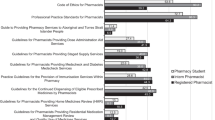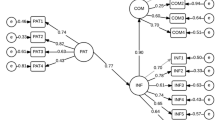Abstract
Objectives: To examine ways in which medicines information pharmacists approach ethical dilemmas encountered in information supply, to appreciate the factors affecting any observed variation in responses, and to identify any training deficits among medicines information (MI) pharmacists in this area.Method: A questionnaire was circulated to all medicines information pharmacists working in the hospital pharmacy service in the United Kingdom. The survey presented ten realistic scenarios involving requests for information on a variety of topics from 'lay' callers. Main outcome measures: Respondents were asked to identify any perceived ethical dilemmas presented by the scenarios and to indicate their preferred replies. Details on training given or received in this area were also requested.Results: The overall response rate was 151 of 286 questionnaires mailed (52.8%), representing 137 discrete DI centres throughout the UK. Postgraduate clinical qualifications were possessed by 71% of respondents. Just 32 (21.2%) indicated that they gave training on ethical issues surrounding information supply while 57 (37.1%) said they had received such training. Over half (54.3%) had neither received nor delivered training on ethical issues. Of the 32 who said they gave training, 21 had received training themselves. Only 4 (2.6%) said they had a protocol in place for dealing with enquiries from members of the public.Conclusions: There was considerable variation in how respondents thought the scenarios might be resolved, emphasising the varying levels of appreciation of the issues and lack of a uniform approach to management. An interesting dichotomy emerged between liberal and conservative approaches. Liberal pharmacists clearly believed that all MI data is in the public domain and should be produced and evaluated on request because patients have a "right" to it. The conservative pharmacists had a more protective attitude toward the patient and believed that patients should not be given information by MI pharmacists directly; rather that it should be channelled through the patient's doctor. These two approaches are not incompatible, and may be adopted by the same pharmacist at different times. From their observations, the authors propose a basis of an ethical guideline for MI pharmacists.
Similar content being viewed by others
References
Hands D, Judd A, Golightly P, and Grant E. Drug Information and advisory services-past, present and future. Pharm J 1999;262:160-2.
Dombrowski SR, Visconti JA. National audit of drug information centres. Am J Hosp Pharm 1985;42:819-26.
Arnold RM, Nissen JC, Campbell NA. 1987 Ethical issues in a drug information centre. Drug Intel Clin Pharm 1987:21:1008-11.
United Kingdom Drug Information Pharmacists' Group. Legal and ethical Aspects of Drug Information. In: Judd E. (Ed). UK Drug Information Manual (3rd Edn.), Leeds, 1997.
Medicines, Ethics and Practice-A Guide for Pharmacists (25). London, Royal Pharmaceutical Society of Great Britain, July, 2,001.
United Kingdom Drug Information Pharmacists' Group. Directory of hospital pharmacists employed in information work. 1997-1998, Trent Drug Information Centre, Leicester Royal Infirmary, England.
Edwards SJ, Lilford RJ, Thornton J, and Hewison J. Informed consent for clinical trials: in search of the ‘best’ method. Soc Sci Med 1998;47(11):1825-40.
Kemper DW. Trust on the health internet. Managed Care Quarterly 2001;9(1):9-18.
Kelly WN, Krause EC, Krowinski WJ, Small TR, and Drane JF. National survey of ethical issues presented to drug information centres. Am J Hosp Pharm 1990;47:2245-2250
Veatch RM. Hospital pharmacy: what is ethical? Am J Hosp Pharm 1989; 46: 109-115.
Smith F. Survey research: (1) design, samples and response. Int J Pharm Prac 1997;5:152-166.
Appelbe GE, Wingfield, J. The importance of law and ethics. Pharm J 1998;261:286.
Barber N, O'Neill R. 1999 Suggestions for a new code of ethics. Pharm J 1999;262:923-925.
Beauchamp TL, Childress JF. Principles of biomedical ethics. (4th Edn.) Oxford University Press, Oxford, 1994.
Seedhouse D. Lovett L. Practical Medical Ethics John Wiley and Sons, Chichester, 1992.
Purtilo R. Ethical dimensions in the health professions. (2nd Edn.) W.B. Saunders, London, 1993.
Author information
Authors and Affiliations
Rights and permissions
About this article
Cite this article
Wills, S., Brown, D. & Astbury, S. A survey of ethical issues surrounding supply of information to members of the public by hospital pharmacy medicines information centres. Pharm World Sci 24, 55–60 (2002). https://doi.org/10.1023/A:1015513705359
Issue Date:
DOI: https://doi.org/10.1023/A:1015513705359




